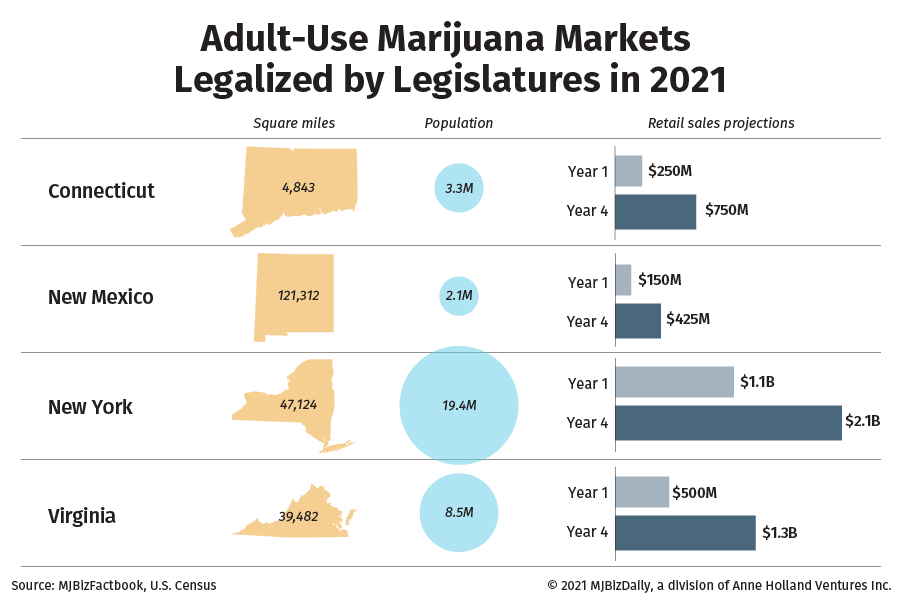The explosive growth of e-commerce during the COVID-19 pandemic has propelled new interest in acquisitions involving direct-to-consumer cannabis delivery.
Some marijuana companies have acquired delivery-only cannabis dispensaries, while others have spent more to acquire vertically integrated MJ firms with home-delivery operations included.
Companies involved in recent delivery-related acquisitions have said that the deals help them:
- Quickly access an existing base of loyal delivery customers.
- Gain delivery expertise to apply to their existing operations.
- Leverage delivery assets in other U.S. markets.
“I think these M&A transactions are a part of a bigger phenomenon, which is the growth of delivery,” said investment banker Frank Columbo, director of data analytics at Viridian Capital Advisors, which tracks capital raises, mergers and acquisitions in the cannabis sector.
“It’s one way to achieve that – you acquire it.”
Delivery deal-making
Several delivery-related acquisitions have taken place in the vast California market, where delivery “is critically important because of the nature of local regulation,” Columbo said.
Because so many California jurisdictions have opted out of allowing dispensaries, Columbo explained, “home delivery allows companies to reach out to places where they would have loved to have had a dispensary, but can’t.”
California-based cannabis company Terra Tech announced a deal to purchase Sacramento-area delivery company SilverStreak Solutions for an undisclosed sum in June, shortly before merging with California-based Unrivaled and becoming Unrivaled Brands.
“Certainly, with COVID, the direct-to-consumer business expanded quite considerably,” Unrivaled Brands CEO Frank Knuettel told MJBizDaily.
“But we don’t think that that’s a short-term issue. We think there’s a real long-term value and component to the cannabis sector in the delivery operations in California.”
Florida-based marijuana multistate operator Stem Holdings closed a 41.3 million Canadian dollar ($31.1 million) acquisition of California cannabis delivery company Driven Deliveries in December 2020, becoming Driven by Stem.
After observing the increase in deliveries of all kinds of consumer goods during the pandemic, “we realized that we needed to be in that last-mile delivery business,” Driven by Stem CEO Adam Berk told MJBizMagazine.
However, Berk’s previous experience as CEO of the online food-ordering platform Osmio, which became Grubhub, taught him that building a successful e-commerce business takes time – hence the Driven Deliveries acquisition.
Other, larger acquisitions involving cannabis delivery elements have taken place outside California.
Chicago-based multistate marijuana operator Cresco Labs closed its $213 million acquisition of Florida medical cannabis company Bluma Wellness and its home delivery operation in April.
Bluma’s One Plant stores earned 15% of revenue from delivery, Cresco said when it announced the acquisition.
Acquisitions target quick growth, new markets
British Columbia- and Nevada-based cannabis company Fiore Cannabis announced plans in June to acquire San Francisco Bay Area-based cannabis delivery company California Patients Club.
Fiore President and CEO Erik Anderson said the $1.2 million transaction will provide “a nice, tidy, profitable little business that has the opportunity to grow” in the Bay Area, a new market for Fiore.
“I like the Bay Area because it’s got a huge population, a lot of connoisseur-type customers,” he said.
“We’re acquiring an existing customer base that’s very loyal to (California) Patients Club.”
On top of that, Anderson said the owner of California Patients Club will stay on to run the delivery business, giving Fiore access to his delivery expertise.
Unrivaled Brands CEO Knuettel said the SilverStreak acquisition will give that company “one of the strongest, if not the strongest, player in the greater Sacramento area.”
“Trying to re-create the brand-name awareness, the customer database, the operational platform, would take time and money,” he said.
“This is an opportunity for us to accelerate our growth … maybe even for (less money) than trying to create a new brand name,” Knuettel added.
“And at the same time, we can leverage their technology and their platform into our other facilities.”
In some cases, companies acquiring delivery companies plan to use those services to boost their operations in other state markets.
Driven by Stem, for example, is featuring home delivery prominently in its plans to enter the Michigan market later this year.
New York-based Columbia Care completed a $240 million acquisition of Green Leaf Medical in June, a deal that included home cannabis delivery services in Maryland and Virginia.
The Maryland delivery assets could also be leveraged in adjacent markets such as Delaware and Washington DC, Columbia Care said.
Looking to the future
A regulatory shift toward permitting cannabis delivery during the pandemic suggests that marijuana companies interested in buying existing delivery operators could have new acquisition targets in the future.
Colorado issued its first medical marijuana delivery permit in 2020 and its first recreational cannabis delivery permit earlier this year.
In Massachusetts, 90-plus applications for marijuana delivery licenses were submitted as of late June.
And British Columbia, Canada’s fourth-largest legal cannabis market in terms of monthly sales, launched home delivery by private-sector marijuana retailers last week.
Unrivaled Brands CEO Knuettel observed that recent delivery-related acquisitions are taking place in the context of an industrywide consolidation trend as the cannabis sector recovers from a period of scarce capital.
However, he added, “at a micro level, (direct-to-consumer delivery) is one of the more appealing asset classes in the cannabis sector.”
“In states where direct-to-consumer (delivery) is allowed, I certainly would expect to see an increased trend of acquisitions,” Knuettel said.
Younger consumers tend to be more interested in remote purchasing and home delivery, he observed.
“And that matches pretty well with the growth in the cannabis sector.”
Viridian Capital’s Columbo similarly expects to see delivery-related deals continue in the context of overall e-commerce growth.
“E-commerce is growing at multiples of the growth of in-store commerce,” he said.
“And I think that that same thing will be happening in the cannabis world.”
Solomon Israel can be reached at solomon.israel@mjbizdaily.com.





